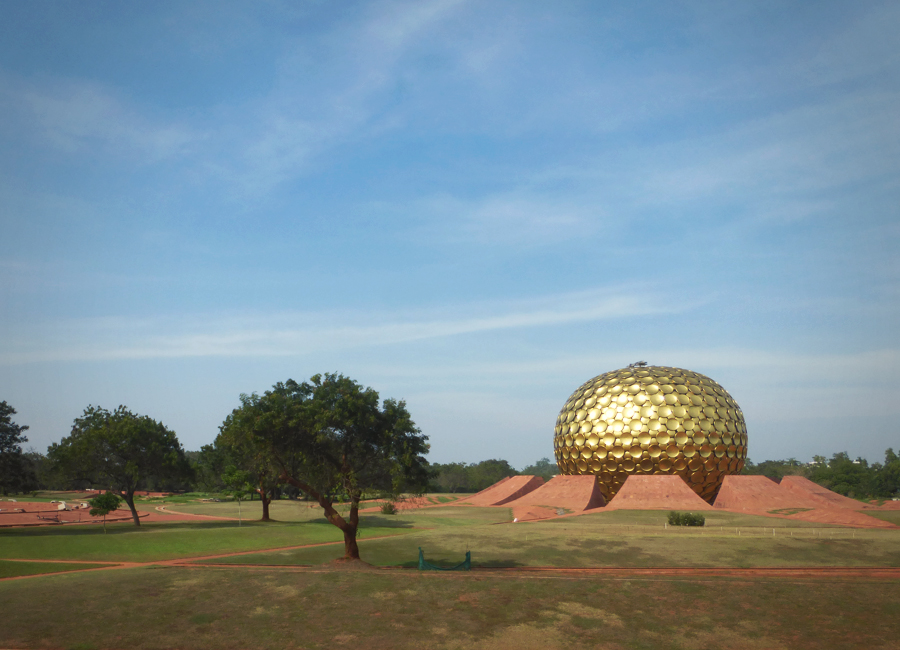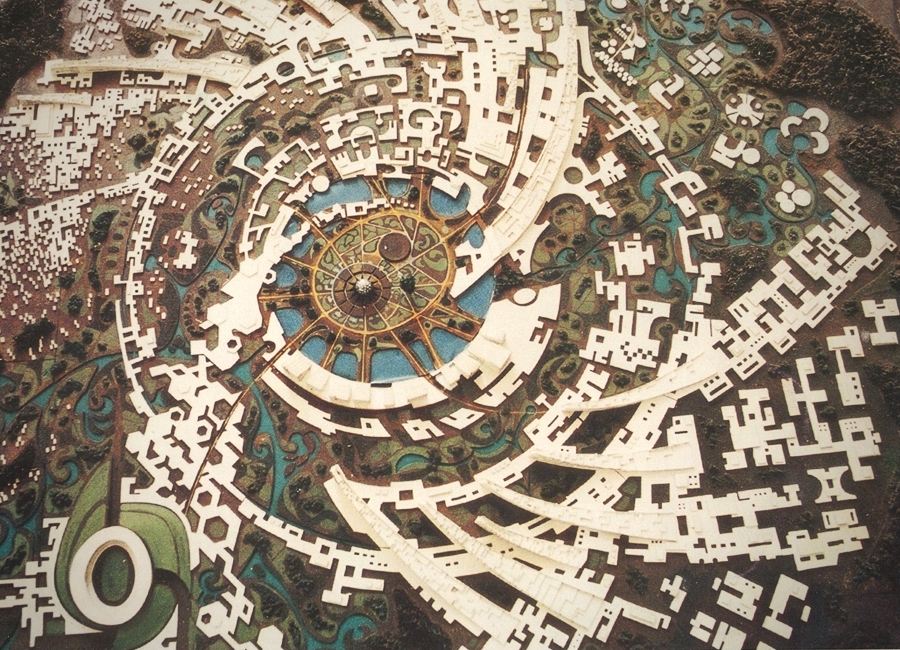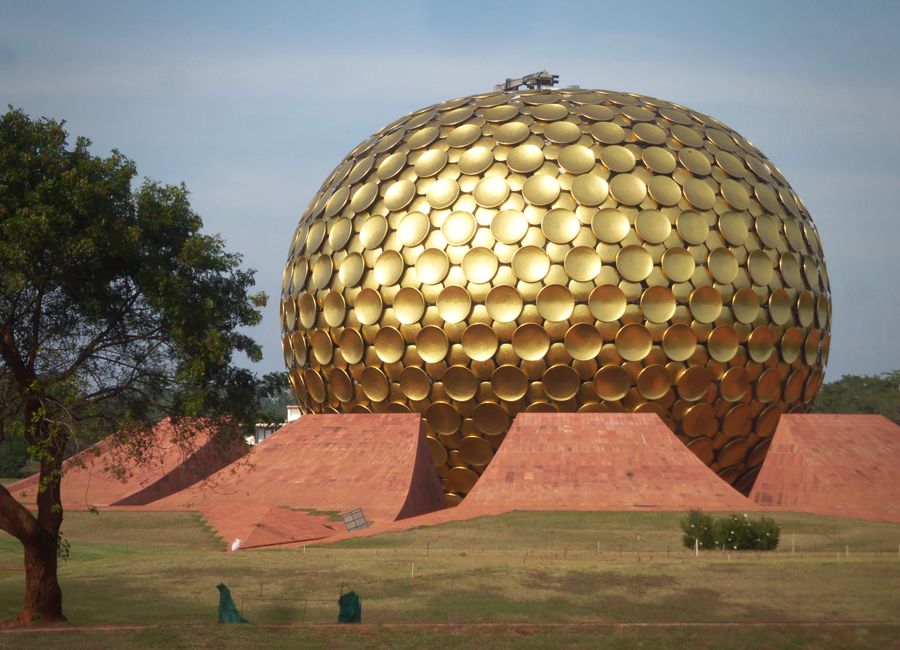|
Emma: Do you want to go to Auroville? Me: Sounds like a Lars von Trier movie! On reflection after visiting Auroville and digging a little deeper it seems my nerdy film director remark was not too far from the truth. The idiosyncrasies of life in the microcosm of Auroville have many parallels with several of Lars von Trier’s movies. Auroville is an experiment in the making - a “universal township” started in the late 1960’s to realise “human unity” for a population of up to 50,000 people from around the world. Situated near Pondicherry in south-east India the township is now home to 2,345 people coming from 50 nationalities all working together towards peace, sincerity and truth; creating the ideal society beyond all social, political and religious conviction with an emphasis on education, self sustainability and creativity. It’s a proposed utopia here on planet earth where the emphasis is less about capitalism and more about socialism. In Auroville money is no longer the “sovereign lord”, material wealth and social standing play no role with the focus being placed on individual worth: what you can offer as a human being. Auroville, or the ‘City of Dawn’, was founded in 1968 by ‘The Mother’, whose image is unnervingly plastered on nearly every home, building, and public space around Auroville. She was inspired by her relationship with Sri Aurobindo, an Indian philosopher and yoga guru and in 1968 announced her 4-point Charter laying the foundations for her vision of “integral living”.
Now this is all starting to sound a little culty* and not to dissimilar to the synopsis of Lars von Trier’s movie ‘The Idiots’ where a group of perfectly intelligent young people decide to react to society's cult of an aimless, non-creative and non-responsible form of intelligence by living together in an alternative community. The film focuses on a new recruit, a lost soul, who is introduced to their megalomaniac leader. The Auroville website states “One lives in Auroville in order to be free from moral and social conventions”. In ‘The Idiots’ the group’s main activity is going out into the world of "normal" people and pretending to be mentally retarded! The Idiots view themselves with a self-righteous air of confidence that elevates them above “normal” people. They belong to something special and are protective of the group in fear of outside influences. Auroville has it’s own printing press and in one of the many gift shops that visitors can access you can purchase many books about the Guru’s philosophy along with publications written by the residents. The cities Outreach Media Centre, an Orwellian-esq committee established to monitor press about Auroville, keeps a close eye on what is published about the community by its own press and certainly by outsiders. A model in the visitors centre demonstrates how the town, designed by architect Roger Anger, will spiral out like a universe from the central Matrimandir, the ‘soul of the city’ through several planned zones with names seemingly inspired by ‘The Crystal Maze’: Industrial Zone, Residential Zone, International Zone, Cultural Zone and Green Belt. Sadly the current reality doesn’t look much like the model with the exception of its centrepiece! The Matrimandir, a large golden sphere, is situated in a huge open area called 'Peace', from where the township radiates outwards. It’s a place “for trying to find one's consciousness” and not for a frenzied attempt at acquiring gold notes like in the Crystal Maze. The Inner Chamber in the upper hemisphere of the Matrimandir is akin to the set of a sci-fi version of an Indiana Jones movie, completely white, with white marble walls and deep, white carpeting. In the centre sits a pure crystal-glass globe which permeates a ray of electronically guided sunlight that falls on it through an opening at the apex of the sphere. The inner chamber is the heart of the city, but unlike the churches and temples of the past this space is devoid of images, organised meditations, flowers, incense, religion or religious forms. As an Aurovilian this space is about YOU and for YOU… but not your ego! The gardens surrounding the Matrimandir are manicured and in stark contrast to the rest of India. The garden is divided into 12 parks each named after attributes we should all strive for "Harmony", "Bliss" and “Perfection" to name a few. Ironically, the immaculate gardens are cared for by lesser-educated Indian workers from outside Auroville, working on a standard salary. They are not the only outside ‘help’; Auroville employs over 5000 villagers as cleaners, watchmen, masons, drivers, waiters and a whole host of other people generally in less-skilled, labour-intensive positions.
This is starting to sound a little neo-colonial now, where’s the Raj? Well Auroville claims that where possible, when a clerical, supervisory or managerial position cannot be filled by an Aurovilian, it places a well-qualified local person in that position. Local people freely approach Auroville for work and the town does offer good rates of pay, great working conditions, pensions schemes and a whole host of other benefits. Unfortunately, illiterate or unskilled people can only be employed in jobs they are capable of performing. As far as I could tell there are no programs in place to improve education amongst the employed locals despite Auroville doing practical work to improve the quality of life in the surrounding villages. It is true however that Auroville’s location has indeed brought a huge income to the surrounding area. For ‘foreigners’ living in Auroville work is not a way to earn a living but a way to express yourself and to develop skills which benefit the community as a whole. Artists and writers are welcomed with open arms, and the arts are accessible to all. Obviously a place like this attracts humans of good will with sincere aspirations, so how do I sign up? Well there is a waiting list to become an Aurovilian because of an apparent housing shortage (probably due to a disproportionate amount of yoga instructors to builders). The lengthy two-year application process requires you to prove you are dedicated to ‘the cause’. You must work for free as a contribution to Auroville and, from what I’ve read on the internet, you are not allowed to leave for two years! In the plot to Lars von Trier’s ‘Dogville’ Nicole Kidman’s character is reluctantly accepted into a small Colorado town. In exchange, she agrees to work for them. She finds out that their support has a price and the town's sense of goodness takes a sinister turn, as her freedom becomes a workload and treatment akin to that of a slave… That’s unlikely to happen in Auroville! After your two-year probation period you are asked to stand before a small group that reviews applications and ultimately decides if you can become an Aurovilian. So is it still possible to live in 2016 using the ideals of hippies from 1968? Some people move to Auroville to escape while others are clearly looking for answers, for some though I’m pretty sure it has become just something ‘cool’ to do. The town didn’t feel as ‘hippie’ as I was expecting, the gift shops and cafes had an air of wealthy East Dulwich about them and we spotted countless cool-looking 30-somethings eating overpriced organic salads. Sadly, I think moving to Auroville has possibly become the latest ‘thing’ for wealthy trendy ‘hipster’ families from Europe to do. One local woman told us the town is full of rich Europeans who desert Auroville during the hot summer months, which is not really embracing the spirit of the place! On paper the dream still sounds inviting, but unfortunately, after nearly 50 years it’s clear that the experiment has exposed some flaws in the original philosophy. Auroville is seemingly a utopia with contradictions; this shouldn’t belittle the concept though. For a place that claims to renounce money, material wealth and politics there sure seemed to be a lot of it going on! History has proven that where there are people there are politics, India is a country bursting with bureaucracy (and corruption) to which Auroville is not immune. For Auroville to exist it has to work closely with the Indian Government who partially fund the experiment. Under the umbrella of the Auroville foundation exist plenty of working parties and councils: Auroville Foundation, Advisory Council, Working Committee, Auroville Board of Commerce, Auroville Council, Residents Assembly, Executive Council and the Village Liaison Group. Aurovilles income comes from NGO sponsorship, profits from commercial units within Auroville, from a number of 'Auroville International' centres around the world, from guesthouses, donations and from the Aurovilians themselves. As an Aurovilian you can still access savings from your country of origin. If you don’t have any savings the community meets all your needs, and provides a cash allowance or 'maintenance' (a monthly sum, just enough to meet your basic needs), which you receive from the commercial unit or community service you work for. It doesn’t matter if you are rich or poor there is no private ownership of land, housing or business in Auroville as you are constantly investing in the collectively owned land, housing and business. Ultimately the land still belongs to India and Auroville could be evicted at any time! The cities aim was to become self-sufficient, at present Auroville can only produce adequate amounts of milk and some seasonal fruits. It produces only part of its total rice and grain requirements, and less than 50% of its total fruit and vegetable requirements. Maybe the artists need to spend a little more time out in the fields? Ironically most families in rural India are pretty much self-sufficient. In Lars von Trier’s movie ‘Dancer in the Dark’, the lead character Selma (played by Bjork), an east European girl (of which there are 44 in Auroville) travels to America with her young son, chasing the ‘American Dream’ she expects it to be like a Hollywood musical only for the story to end tragically. So is there ever trouble in paradise? Having spoken to several Indians living and working on the periphery of Auroville, the utopian vision occasionally turns sour. Conflicts between locals and Aurovilians (baring in mind a large percentage of Aurovilians are Indian) are frequent. The same typical disagreements arise that would happen in any organised society: bad behaviour, disproportionate workloads, non-payment of monies, etc, etc. One main factor that agitates the surrounding villages is the sense of ‘us and them’. Seemingly, the residents of Auroville don’t want to share their knowledge with the locals. Again this attitude is not really embracing the spirit of Auroville. It’s easy to understand why though. Being an Aurovilian is something special, if all the surrounding villages operate in the same way; using the same water harvesting techniques, waste management, recycling, etc then Auroville is nothing special and all the westerners who want to move there are essentially just living in rural India and thus losing the superiority that comes with being an Aurovilian. This haughtiness in part possibly stems from this quote I found on Auroville’s website relating to evolution “Ultimately the people here believe they are helping humanity move beyond its present limitations”. If that doesn’t bolster your ego and give you an air of superiority then nothing will. Sadly, the Mother’s vision of a utopia based around spirituality where “One can unite with the Divine only by mastering one’s ego” has now possibly been resigned to the history books. Auroville may not be perfect, but it is important for a place like this to exist. An alternative formula for a new way to live and think, where balance and harmony with each other and the environment are the focus. Obviously a daring experiment this bold faces enormous challenges and leaves itself open to criticism (as demonstrated above – at least I didn’t mention the suspicious death of an American student!) and after visiting the place it is very easy to be cynical, however as our world grows increasingly more consumerist it is still as a refreshing concept now as it was back in 1968. More people than ever still believe in the dream and want to flock to this, the world’s largest (and growing) existing spiritual utopia. *As an internationally recognised township project, endorsed by UNESCO and supported by the Government of India Auroville is not operating as a cult!
0 Comments
Your comment will be posted after it is approved.
Leave a Reply. |
Archives
July 2020
Categories
All
|
Proudly powered by Weebly




 RSS Feed
RSS Feed